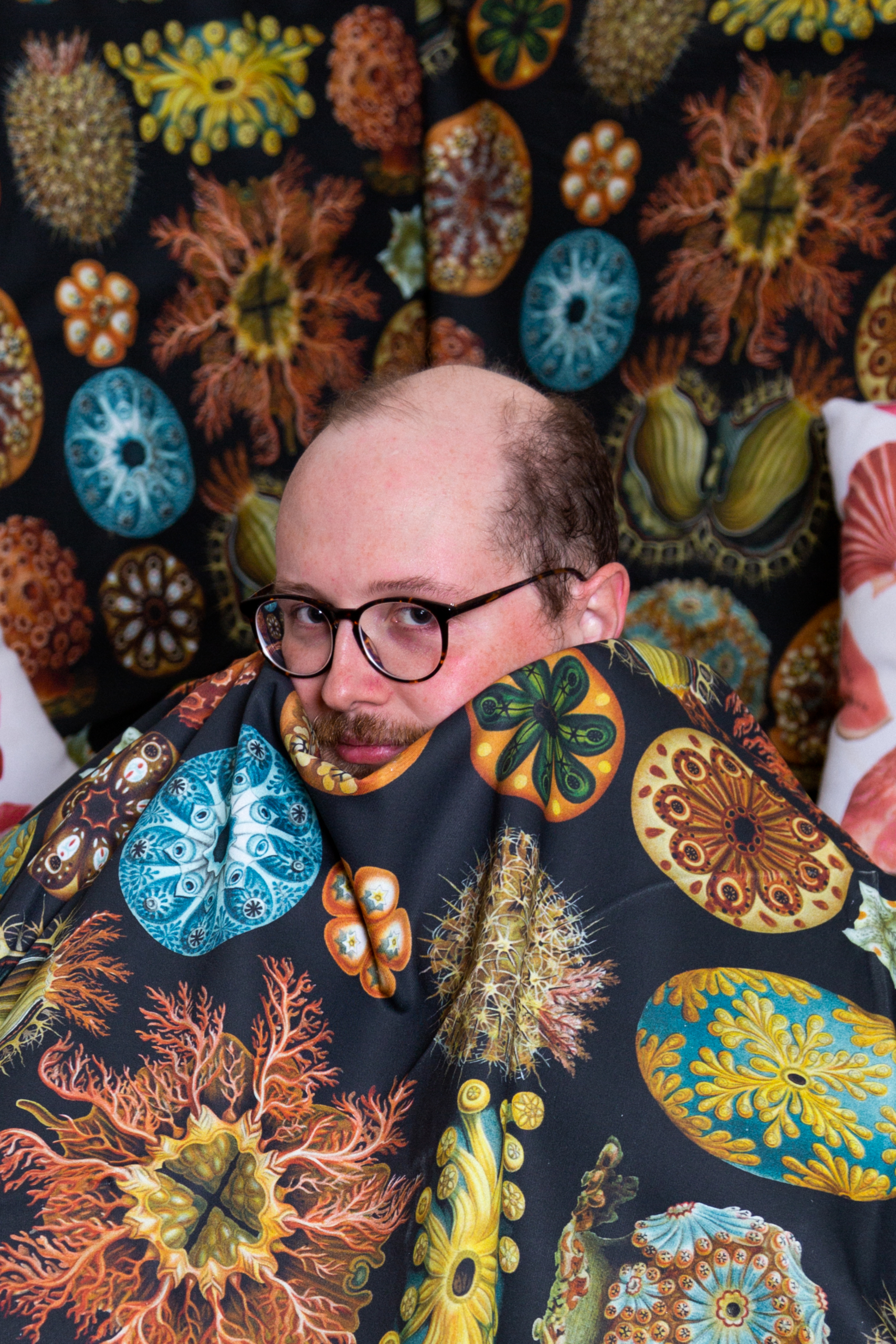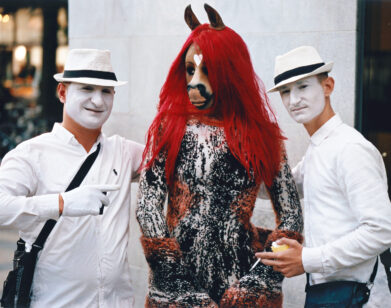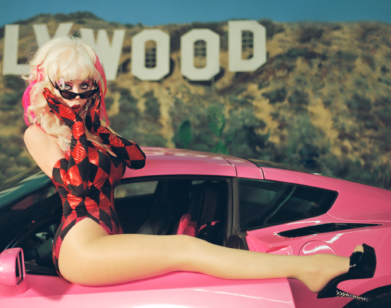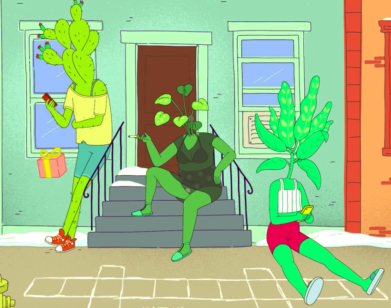Dan Deacon and Aparna Nancherla Hate Burning Man But Love Pears

Photo by Micah E. Wood
Musician and composer Dan Deacon celebrated today’s release of his latest album, Mystic Familiar, with a harrowing trip to the gym. You may know Deacon from his kaleidoscopic synth-pop records and all-consuming live shows, but some of us prefer to remember him as the mastermind behind Drinking Out of Cups, a crudely mastered 2006 nugget of YouTube gold in which a lizard with a Long Island accent makes coarse (read: very coarse) observations against a background of rotating ClipArt images.
Mystic Familiar is a study in vulnerability and the simultaneous jubilance and anxiety that often accompany it. This tension is apparent even in the titles of the album’s tracks: “Arp ll: Float Away” is a fizzy, hopeful, up-tempo song, while “Arp lll: Far From Shore” feels like the comedown—screeching saxophones and mournful synths create a feeling of isolation that’s hard to shake.
The crown jewel of Mystic Familiar is the Aparna Nancherla-anchored music video for “Sat By A Tree,” the album’s lead track. The video, a meditation on death and decay that is somehow both sweet and repulsive, is disarmingly charming: an elderly Nancherla lies in the forest covered in bugs and patiently waits to die. Nancherla’s comedy chops are on subtle display in the video; she looks on with mild curiosity, yawning like a bored commuter, as worms and snails crawl over her body, eventually digesting her entirely and leaving behind nothing but a wiggling ear in the soil.
True to form, Deacon and Nancherla got together for a playful discussion about existential dread, the Burning Man hellscape, and the magic of pears.
—MARA VEITCH
———
DEACON: Hello!
NANCHERLA: How’s it going?
DEACON: I went to the gym this morning for the first time in, like, 100 years and I feel like someone just beat the living crap out of me. I was following this old man who was using all the machines. I was like, “If he can do it, I can do it,” and that statement was not true. How are you doing?
NANCHERLA: I’m pretty good. I’m on the West Coast. Are you on the East Coast?
DEACON: I’m back in Baltimore, and it’s finally winter. Baltimore pretends like it never snows. It snows every year, multiple times a year!
NANCHERLA: Yeah, I grew up outside D.C. and it’s the same thing there.
DEACON: How do we not just own more plows?
NANCHERLA: I don’t know! It’s like we forget, every year, that it snows.
DEACON: I’ve been wanting to ask you this since the video shoot. Did you end up doing a set right after that shoot?
NANCHERLA: No, I got out a little too late.
DEACON: Got you. I just kept thinking what kind of mindset it would be to go from laying completely still and pretending you’re basically a dead body, and then get on stage and perform. That would be a really rough transition.
NANCHERLA: Yeah. I feel like I’ve done that a couple times before where I’ve gone from a very non-stand-up situation to performing in front of a live audience and it’s always pretty jarring. I wouldn’t say it creates my best work. Mentally, there’s a lot of setup required.
DEACON: Oh, for sure. That’s why I can’t fathom it.
NANCHERLA: No, I get that very much. On the spectrum of comedians, I probably fall more on the side of preferring more notice. Some people just can turn it off and on very seamlessly. Or they never really turn it off.
DEACON: Yes. That is exhausting.
NANCHERLA: Yeah. That’s a tough green room energy to be around for too long.
DEACON: Oh yeah, because comedians all share the same green room. That’s another difference between us. Venues like to quarantine musicians in separate quarters.
NANCHERLA: I know. Sometimes, though, when you open for a bigger name, they’ll quarantine you away from them so you don’t infect them.
DEACON: I’m getting a package.
NANCHERLA: Ooh! Do you know what it is?
DEACON: I don’t. I buy a lot of stuff impulsively online. It’s a habit I’m trying to change, but I did delete all my delivery apps. I no longer get any food delivered to my house.
NANCHERLA: Whoa! You go pick it up?
DEACON: I go pick it up at the place where it’s made like a person from 1995.
NANCHERLA: I’m also really bad with online shopping. I feel like it’s become truly a compulsion and I don’t know how to stop.
DEACON: Yeah. I really like your standup about blocking and muting social media apps.
NANCHERLA: Oh, yeah! Do you think people actually avail themselves of Instagram Mute? I can’t tell, because sometimes when I did that joke, it felt like people either really related to it or they were just like, “Huh? What do you mean Instagram Mute?” It really changed the game for me.
DEACON: What are you doing in L.A.?
NANCHERLA: I’m here shooting the third season of Corporate [the Comedy Central show]. I feel kind of spoiled whenever I miss East Coast winter, but that’s how it shook out this year.
DEACON: Whenever it’s possible I schedule my tour to be in January and February, away from the East Coast.
NANCHERLA: Yeah. I really thought I was someone who liked winter, but I think it’s the lack of sunlight that really gets to me.
DEACON: When we were shooting the video, had you already wrapped BoJack Horseman?
NANCHERLA: I think so.
DEACON: Your character has a pretty big cliffhanger at the end. I love how they’re doing it like Sopranos and Mad Men-style with the two half seasons. It really puts BoJack in the antihero company of Don Draper and Tony Soprano.
NANCHERLA: It’s funny, I was never in L.A. when I recorded for that show, so it felt a little bit disjointed. I would just record it in a studio with the director, or do a table-read over a conference call. Oof. Table-reads on conference calls, that’s the worst.
DEACON: I can’t imagine that.
NANCHERLA: I mean, it’s better in that you don’t have to look at the room full of people, and then you feel like none of the jokes are hitting with the right delivery. I don’t know, it turns into kind of a mess.
DEACON: I would just be imagining the other people in the room looking at each other, not saying anything, feeling uncomfortable.
NANCHERLA: Right. Yeah. It’s like waiting for your line to come out, and then it always comes out one beat too late.
DEACON: So you just see the director, too. When I score a film, I don’t really meet anybody else besides the director through email or a couple of meetings, and then I go to the film festivals and the team is like, “Oh my God! Do you remember when we were in Paris for two weeks?” and I’m just like, “Yeah, I saw the emails. That looked fun.” Because I work mostly in isolation, I’ll watch a film 25,000 times, and then I’ll meet up with everybody I still feel like, “Hey, yeah, I’m in, too! What’s up? How’s it going?”
NANCHERLA: Yeah. Sometimes I’ll talk to editors and they’ll be like, “I have seen your face 40,000 times but you probably have no idea who I am.”
DEACON: Yes, that is my world.
NANCHERLA: Yeah, and I never thought about that with the music. At what stage does the music come in? Is it as they’re editing?
DEACON: It changes. Sometimes it’s right at the very beginning, other times it’s like, “This film is completely locked and we need music… we’ve been editing to Radiohead for two years and can’t use any Radiohead, so … ” Other times it’s pretty fluid. But it tends to be late.
NANCHERLA: Do you do a lot of scoring for movies and other things?
DEACON: I’m trying to do more of that. I love touring and traveling, but it’s just so exhausting. I like scoring because I can do it from home. I don’t really watch documentaries, so when I have to score one, I can be like, “You know what? Maybe I do want to learn about electric race cars.”
NANCHERLA: And then you’ll learn everything you ever wanted to know.
DEACON: Well, yeah. There was a film that I scored about electric race cars, and I had been watching these guys for so long, and we’re at the party and I’m talking to them like I know them and they’re like, “I’m sorry, who are you? Who is this weird dude at this party?”
NANCHERLA: Yeah. There’s definitely a range of three reactions if you tell people you do comedy. It’s either they name someone they like who you don’t like, or they ask you where you perform. I feel like it’s the less common now where they’ll be like, “Tell me a joke.” More likely they’ll be like, “You don’t seem like a comedian,” or, “Oh I could tell you’re a comedian.” They have to contextualize you for themselves.
DEACON: Yeah. If I tell people I make electronic music, they’re like, “Oh, that’s cool. My nephew does that. What else do you do?”
NANCHERLA: Yeah. It’s like when people are like, “I’m a DJ.” People are like, “Oh. Okay. I see what’s happening here.”
DEACON: I deejayed at Burning Man this year, and I don’t ever want to go back there. No offense if you’re a Burner. You don’t really come across like a hardcore Burner.
NANCHERLA: I’m not! What if I was secretly a Burner?
DEACON: I would love it if you were like, “Dude, this is my 20th Burn!”
NANCHERLA: What was it like?
DEACON: It was like Pinocchio’s Island at the end where they all turn into donkeys, but there’s venture capitalists. I was in a sound camp, which means just 24/7 Earth-shattering bass nonstop. I have these custom fitted earplugs that I got from Johns Hopkins. We had a full tent that had air conditioning, and inflatable mattresses, and it just felt so odd and surreal. We went to some spots that I was like, “This seems like what Burning Man probably once was,” but then I’d be back in this EDM hellscape. And being overweight, everyone has just the blondest, whitest ripped skin, and I’m just like, “Oh my god, just put me back in my tent.”
NANCHERLA: It sounds like a nightmare! I mean, already venture capitalists in the desert sounds like a post-apocalyptic film.
DEACON: Yeah, I wouldn’t recommend it for most people. And going to the bathroom was like—I’d have to meditate for 30 minutes before I was like, “Okay, I’m going to go in there and whatever happens, it’s fine. It’s temporary. Then we’ll deal with the aftermath later.” It was rough.
NANCHERLA: Yeah, that’s what it sounds like. How long is it?
DEACON: I think it’s 10 days and we stayed for five. And I think some people show up early to set up. I’m sure there’s hardcore Burners. I have some friends who love it, and they’re like, “No, no, no, you were just in a bad spot. You should’ve stayed somewhere else. There’s wellness areas.” But some people like it, and I’m not trying to shoot down anyone’s hobby or passion. It just wasn’t for me at all. Anyways, sorry for all the Burning Man talk.
NANCHERLA: I have a very strong thread of existentialism that runs through my head every day. A lot of it is around the future and what will happen to us as a species.
DEACON: I used to really want the apocalypse and thought it would be good, and then I realized I was just a privileged idiot. Maybe it’s because I don’t associate with youth culture anymore, so when I see youth culture, I do feel really inspired by them.
NANCHERLA: Yeah, and I guess on the flip side of social media, you can organize mass movements a little bit easier.
DEACON: I feel inspired by everything the younger generation is doing, and in a very kind of old soul way.
NANCHERLA: I know. Our generation was all about the whales and the rain forest and acid rain.
DEACON: I forgot about acid rain. Acid rain’s like the pear of environmental issues. I love pears, but I never remember to buy them.
NANCHERLA: I think that was one of my first bits that hit home was about pears. I can’t remember what I was saying about them but it was to the same point that you’re making, which was that they’re a strange fruit that I forget about a lot.
DEACON: They’re always repped as a little kid, when you have to learn what every single thing is—like apples, bananas, oranges, pears—but I don’t interact with pears on even a monthly basis.
NANCHERLA: And then whenever I have one, I’m like, “This is great!”
DEACON: Pears are incredible. You can’t eat the whole thing. They’re just incredible.
NANCHERLA: They’re pretty good in salads or in desserts.
DEACON: Excellent paired with a nice sharp cheese.
NANCHERLA: Oh yeah!
DEACON: See, this is why our generation isn’t doing anything about the environment. We’re talking about it, then all of a sudden we’re like, “Oh yeah! The decadence of agriculture!”
NANCHERLA: We get sidetracked very easily.
DEACON: What do you think of fame?
NANCHERLA: I don’t think it’s ever been my goal as an artist to reach the 1% level. Some people do have that aspiration, but I don’t think it ever was mine.
DEACON: I like being able to live a normal middle-class life. I think my anxiety would ramp up insanely if I felt constantly examined.
NANCHERLA: Yeah, there’s obviously a huge amount of privilege that comes with that level of wealth, but I think there’s also a weird amount of isolation that comes with it.
NANCHERLA: Yeah, I think some of us are just too sensitive for that life.
DEACON: Yeah, I agree. I feel really vulnerable, not when I’m on stage, but right when I get off stage.
NANCHERLA: Oh yeah. Whenever I get off stage, it’s like I peeled off all my skin and it has to regrow before I’m not completely a raw nerve again. Especially sometimes for comedy, where you’re in a certain head space. When I get off stage, and I’m not that person anymore, I almost feel like I’m letting people down when they interact with me.
DEACON: I just want to say it was really exciting to hear about your process.
NANCHERLA: Oh, likewise. I don’t think I’ve talked to a lot of musicians about their process, so I’m always so fascinated to learn anything about it.
DEACON: I feel like we would make a really good recasting of The Odd Couple.
NANCHERLA: Yeah. I’ve done a lot of music festivals in the past few years, and it always feels like the comedians are idolizing the musicians.
DEACON: Well, I don’t know about that. I would definitely prefer to be in the backstage of the comedian tent than the music tent. It’s just people on their phones being like, “I asked for Fiji water.”
NANCHERLA: Yeah. I think there’s less of that. Comedy green rooms are just either people trying to one-up each other’s jokes, or everyone is in their heads.
DEACON: I wanted to tell you that I think the comedy you did when you started out really empowered a lot of people to talk about anxiety and depression in a way that wasn’t happening before. Thank you for the work you did. I’m sure it was challenging and vulnerable, but it really resonated and it continues to resonate, and I really, really appreciate it.
NANCHERLA: Well I really appreciate it when people are open about talking about their own experiences with it, so thank you.
DEACON: Oh, you’re very welcome. It just makes it easier to know that someone with the level of success you have is out there making work. To know that these feelings might accompany me my entire life, but it adds to the hopeful mindset I’m trying to live in.
NANCHERLA: Yes. It’s definitely an ongoing process. That is what I myself have to keep remembering.
DEACON: Cool. Well, thanks for being in that weird video with all the bugs.
NANCHERLA: You’re welcome! Any time!






